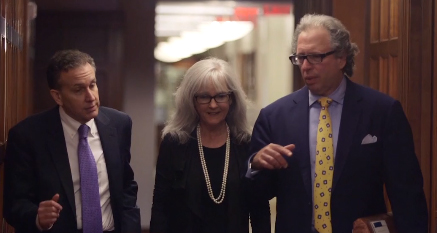NY Domestic Violence Lawyers – Protecting Victims from Workplace Discrimination
Know Your Rights: After surviving abusive behavior,
victims too often suffer at the workplace
The New York City Human Rights Law was amended to protect survivors of domestic violence, sex offenses, or stalking from being discriminated against at their places of employment. Studies have shown that there is a clear adverse impact upon a survivor of domestic violence regarding her ability to maintain and establish financial independence. We want to be sure that doesn’t happen on our watch.
What are Common Issues Suffered by the Victims of Domestic Abuse at the Workplace?

Some of the common issues domestic violence survivors encounter in the workplace are demotion, suspension, loss of pay, loss of benefits, or termination. Often, survivors of domestic violence are fired simply for requesting that protective measures be taken in order to ensure their safety – such as requesting time off to meet with domestic violence counselors.
It is unlawful in New York City to discriminate against an individual or to treat that person differently at work as a result of their status as a victim of domestic violence or as a result of the employer’s perception that the individual is a victim of domestic violence, sex offenses and/or stalking.
This law states: It shall be an unlawful discriminatory practice for an employer, or an agent thereof, to refuse to hire or employ or to bar or to discharge from employment, or to discriminate against an individual in compensation or other terms, conditions, or privileges of employment because of the actual or perceived status of said individual as a victim of domestic violence.
How We Help the Victims of Domestic Violence at the Workplace
You should not have to be victimized twice – once by an abuser, and the second time by your employer.
If you’re being discriminated against (treated differently than co-workers) at your place of employment, write to management and/or your employer’s human resources department, documenting the conduct occurring, the times at which it occurred, and who was involved. If the discrimination continues, or if you are fired, please call us to learn about the legal rights that you may have in response to such wrongful or illegal conduct.
Client Review 
I highly recommend Jack Tuckner and his team to anyone needing legal assistance with employment issues. Regardless of how big a case you may have they treat you like a VIP throughout the entire process. It’s a difficult time when dealing with these kinds of issues Jack and Deborah and the entire team give you help, hope and guidance throughout it. They restored hope for me that I had lost. I am thankful for the great service I received.
Google Review 5 Stars – V.O.
Domestic Violence Discrimination News & Insights
Don’t Quit – We’ll Fight for You!
Please call us or fill out the contact form below for a free consultation. Also, please feel free to click our domestic violence discrimination news and insights below for more information.
- Your Divorce at Work: To Share or Not to Share?
- Spike in Cases of Domestic Violence As a Result of Stay at Home Orders for COVID-19
- The Secret to Filing Administrative Complaints with the EEOC or the SDHR: Don’t Do It!
- German Mayor Sheds Light on Sexual Harassment Responsibility
- Four No-Brainer Changes to Improve the Lives of Women
- Grammy Awards Night denounces Violence Against Women
- Zero Tolerance for Domestic Violence
- Centennial of the Suffragists
- Rape Culture and Warfare
- Talk Back to Rape Culture
Tell Us What Happened
Call 212.766.9100, Text, Or
Deborah O’Rell, Client Advocate
By submitting this form, we will take no action to protect your interests. Submission of this form does not establish an attorney-client privilege.
